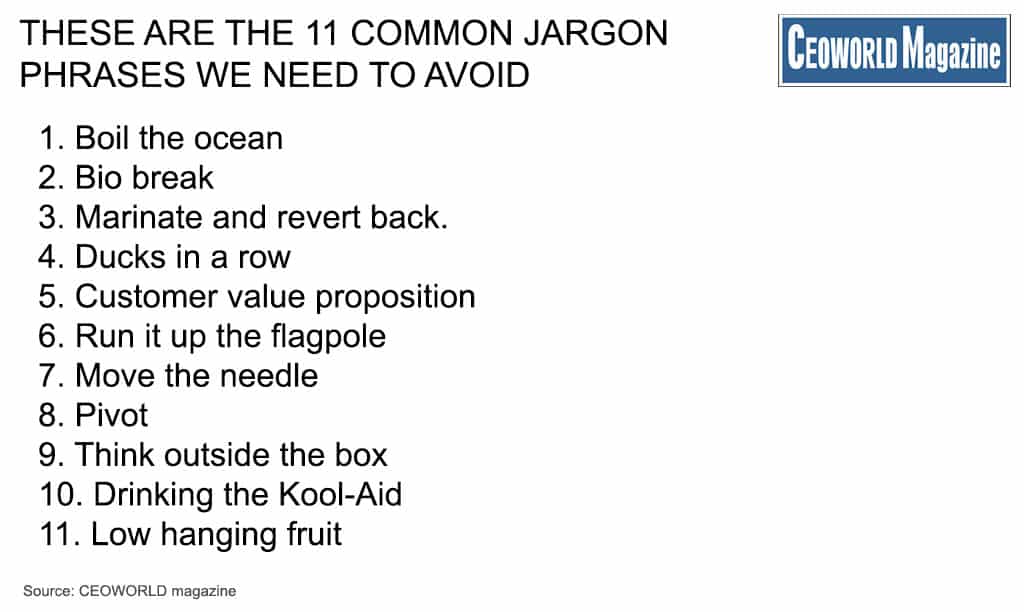The Common Jargon Phrases We Need To Avoid

Jargon is increasingly becoming the default language in business. Sometimes we use jargon to make us sound like we know what we are talking about when perhaps we don’t. The vast majority of the time people use jargon to fit in because everyone else is saying these phrases.
This often occurs when you first start a job in a new company. Our human instinct to fit in sees us quickly adopt the language of our peers, even if we really don’t know what they mean by it.
Below are 11 common jargon phrases and why you should consider avoiding them.
- Boil the ocean: This is often used when we are trying to do something that seems really hard and unnecessary. For example, ‘There is no need to boil the ocean’. A better alternative is, ‘We don’t need to make this harder for ourselves’.
- Bio break: A bio break is short for a biological break. It’s used in meetings to allow people to go to the toilet and perhaps take care of other biologically needs like grabbing a drink of water. I’m not sure why we don’t stick with ‘we need a break’.
- Marinate and revert back.: I have started seeing this at the end of emails to replace ‘let me think about that’ (marinate overnight) and get back to you. Throw in, “Let me marinate and revert back by close of play tomorrow”, and we have a jargon trifecta!
- Ducks in a row: People use this phrase in many different situations. For example, I often hear leaders suggest to their team that they need all their ducks in a row before they go and meet with a client. This makes me wonder if their team know what ducks they are talking about and what row they should be in.
- Customer value proposition: This refers to the things we do for customers. It is closely related to employee value proposition, or in other words the things we do for employees. To make it worse it is often reduced to the acronym of CVP or EVP.
- Run it up the flagpole: As in, “Yeah that is a great idea, that could work, let’s run it up the flagpole”. This one makes no sense to me at all. Why not say, ‘Yeah great idea, let’s share it with a few people to see what they think’.
- Move the needle: This phrase is normally used when the change required needs to make a big difference. For example, moving the needle enough on a measurement scale so that people notice it. It is such a complicated analogy that people very rarely understand what it means.
- Pivot: Twelve months ago, only netballers or ice skaters liked to pivot but now it seems that everyone is pivoting. It means to change direction and many companies use it to discuss their need to pivot for growth. No doubt this will become an acronym reduced to P4G.
- Think outside the box: This turn of phrase illustrates how to think differently and come up with new ideas. The irony being that the expression was first coined in the 1970s, yet people are still using it 50 years later.
- Drinking the Kool-Aid: People use this figure of speech as a warning, as in, don’t believe everything you hear. ‘They drank the Kool-Aid’ indicates that someone naively believed in something. The origin of this phrase comes from the 1978 mass suicide in Jonestown. The cult’s leader convinced his followers to drink Kool-Aid that was laced with potassium cyanide. Considering the back story for the phrase, using it also seems insensitive.
- Low hanging fruit: This slogan means to undertake the easy tasks first. It’s easier to pick the low hanging fruit off a fruit tree than the ones you can’t reach. While the analogy is solid I think it can easily lead to confusion. What exactly is the low hanging fruit and what fruit tree should we be picking them from? It is my belief that most people in business try to communicate in a way that engages and connects with their audience. However, I urge you to be cautious when it comes to using jargon phrases. It easily leads to misunderstanding and ultimately disconnects and isolates the people you are conversing with. Leaders should consider using everyday ‘real’ words that are easy to understand and thus make communication more efficient and effective.
In the words of George Orwell, “Never use a foreign phrase, a scientific word or a jargon word if you can think of an everyday English equivalent.”
These Are The 11 Common Jargon Phrases We Need To Avoid:


Have you read?
# The 100 Most Influential People In History.
# Top CEOs And Business Leaders On Twitter: You Should Be Following.
# Must Read Books Recommended By Billionaires.
# The World’s Top 20 Most Charitable Billionaires.
Bring the best of the CEOWORLD magazine's global journalism to audiences in the United States and around the world. - Add CEOWORLD magazine to your Google News feed.
Follow CEOWORLD magazine headlines on: Google News, LinkedIn, Twitter, and Facebook.
Copyright 2025 The CEOWORLD magazine. All rights reserved. This material (and any extract from it) must not be copied, redistributed or placed on any website, without CEOWORLD magazine' prior written consent. For media queries, please contact: info@ceoworld.biz








